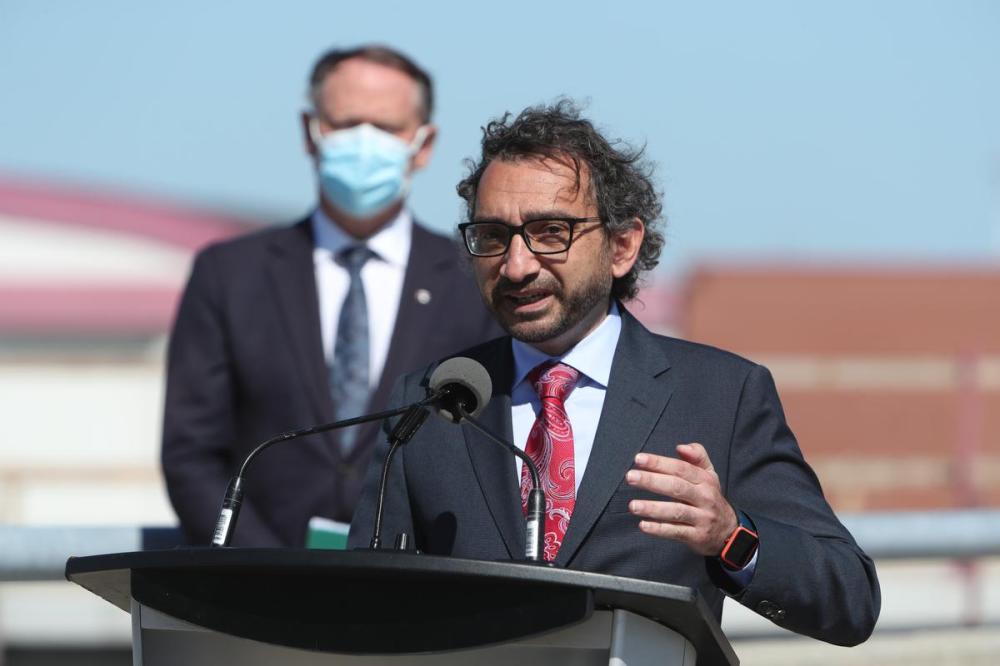Proof of vaccination plans in the works as Ottawa eyes looser border restrictions in July
Advertisement
Read this article for free:
or
Already have an account? Log in here »
To continue reading, please subscribe:
Monthly Digital Subscription
$19 $0 for the first 4 weeks*
- Enjoy unlimited reading on winnipegfreepress.com
- Read the E-Edition, our digital replica newspaper
- Access News Break, our award-winning app
- Play interactive puzzles
*No charge for 4 weeks then billed as $19 every four weeks (new subscribers and qualified returning subscribers only). Cancel anytime.
Read unlimited articles for free today:
or
Already have an account? Log in here »
Hey there, time traveller!
This article was published 16/06/2021 (1246 days ago), so information in it may no longer be current.
OTTAWA—How people will be able to prove they’re fully vaccinated and skip quarantine at the border will become clear within days as Canada readies new health measures for some incoming travellers, says Transport Minister Omar Alghabra.
The plan the federal government is set to unveil will be the first phase of a two-phase system.
Initially, Ottawa will rely on the provincial vaccination certificates that Canadians may already have, and ask inbound travellers to upload those into an app called ArriveCAN, Alghabra said Thursday.

By the fall, travellers will use an automated system that connects to “provincial databases, but respects the privacy of the individual,” he said.
The news comes as questions swirl around the federal government’s plan for vaccine passports, and how soon Ottawa will ease travel restrictions, including hotel quarantine requirements, for fully vaccinated people. Last week, there were indications ending the hotel quarantine would go into effect as early as the first week of July for some.
In an interview with the Star late Thursday, Alghabra said as soon as the government announces when restrictions can be eased, it will be ready with a proof-of-vaccine program.
“When we announce the measures for fully-vaccinated people, it will be in place,” Alghabra said.
Alghabra said the details are not entirely sorted, but the idea is to allow border officers and public health officials “to verify the existing vaccines certificates that travellers have.”
The current closure of the U.S.-Canada border to all but essential travel expires on June 21 and the government has been under pressure not to just let the measures roll over without some adjustments that would take into account rising vaccination rates and falling COVID-19 cases counts.
The government said last week the approach being considered would see the elimination of the mandatory three-day hotel quarantine for fully-vaccinated people eligible to be in Canada.
That’s a list that includes citizens, permanent residents, some members of their families, international students and some foreign workers.
But crucially for the business, airline and tourism industry — there’s no mention of allowing in other groups of people, like tourists and non-essential business travellers.
Internal government polling obtained by the Toronto Star shows Canadians do want a different approach for fully-vaccinated people.
The Privy Council Office — the bureaucracy that supports the prime minister — conducts regular public opinion polling to gauge people’s attitudes of the government’s performance.
Between May 31 and June 6, as pressure to reopen the border continued to ratchet up, it surveyed 1,000 people for their views on the question.
Of those surveyed, Canadians were split on cutting the quarantine time from 14 to seven days for travellers in general.
But when asked about that for fully-vaccinated travellers, 75 per cent of those asked were in support of a change.
Meanwhile, 64 per cent told pollsters they support the end to mandatory hotel quarantine for fully-vaccinated travellers, with 60 per cent supporting an end to it for all travellers.
Seventy-two per cent were opposed to ending mandatory quarantine for all travellers.
The poll had a margin of error of 3.1 per cent, 19 times out of 20.
New sticking points on the border continue to crop up, with the latest being a distinction between which vaccines are approved in Canada and which have the green light in the U.S., with the most notable difference being AstraZeneca.
U.S. regulators haven’t approved it, meaning, as the Star reported earlier this week, Canadians who’ve had it might be turned away, at least from certain events like the first show to open on Broadway since the pandemic took hold.
Earlier Thursday, Alghabra had told the Star’s Susan Delacourt for those coming to Canada, “we’re only accepting certificates of the four accredited vaccines in Canada. So Pfizer, Moderna, AstraZeneca, and Johnson (and) Johnson.”
Alghabra said that will continue for “the foreseeable future.”
Ontario Solicitor General Sylvia Jones told a briefing Thursday that their government is working with its federal, provincial and territorial partners to make sure there is a consistent approach, and that no matter what vaccine people get, they will have the same rights.
The premiers and the prime minister held one of their regular calls Thursday, where the border discussion was high on the agenda. Consensus around the table was that vaccination rates needed to continue to increase before changes are implemented.
With a file from Susan Delacourt, Ottawa bureau
Tonda MacCharles is an Ottawa-based reporter covering federal politics for the Star. Follow her on Twitter: @tondamacc
Stephanie Levitz is an Ottawa-based reporter covering federal politics for the Star. Follow her on Twitter: @StephanieLevitz



